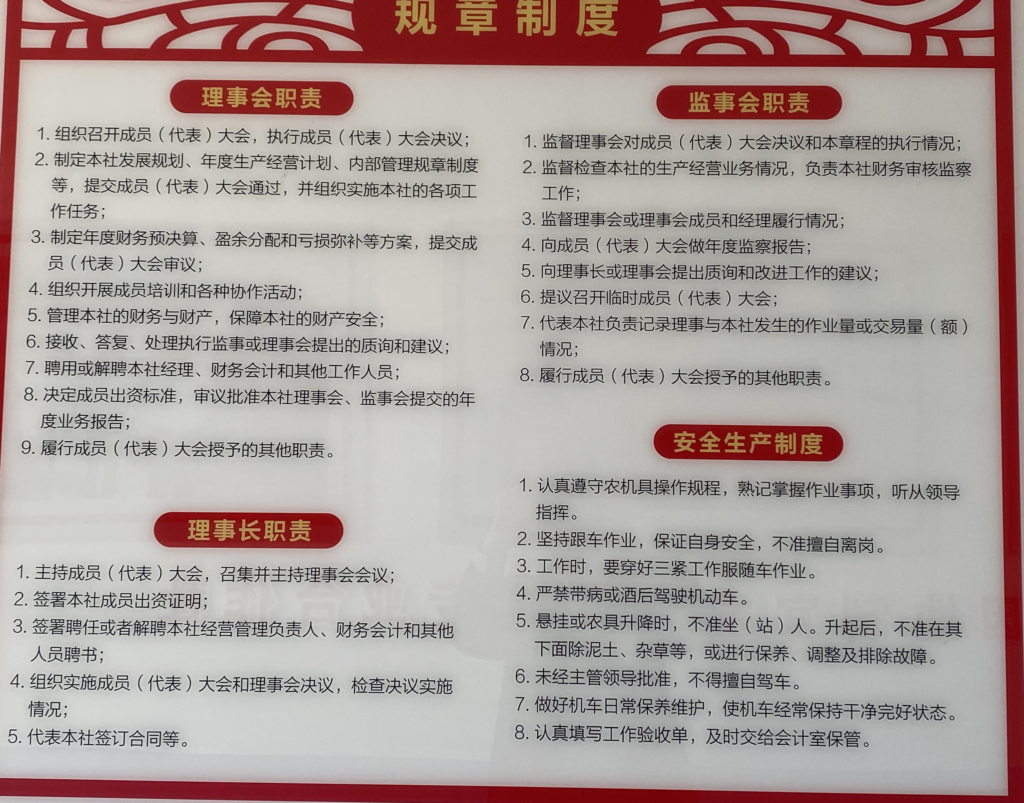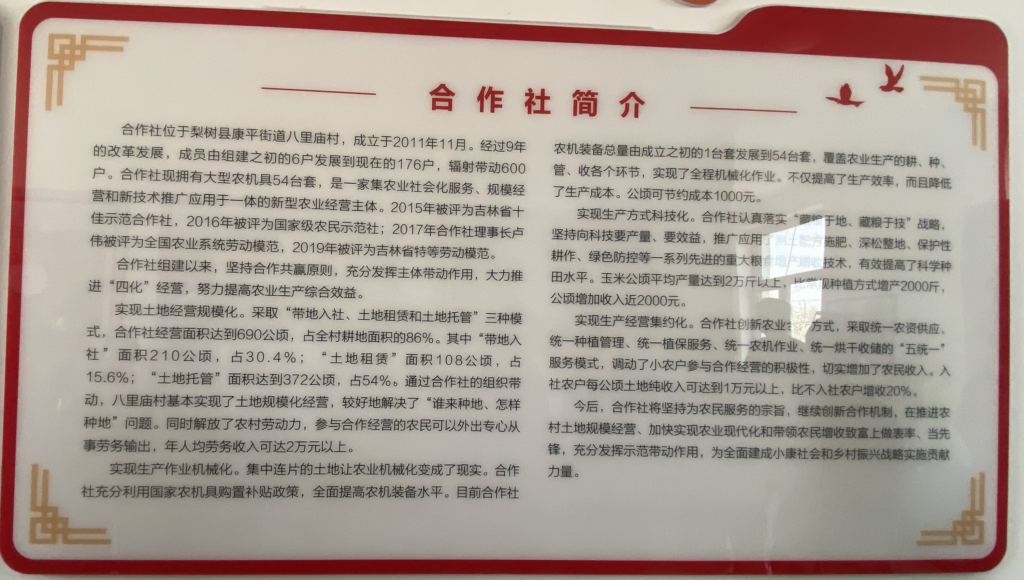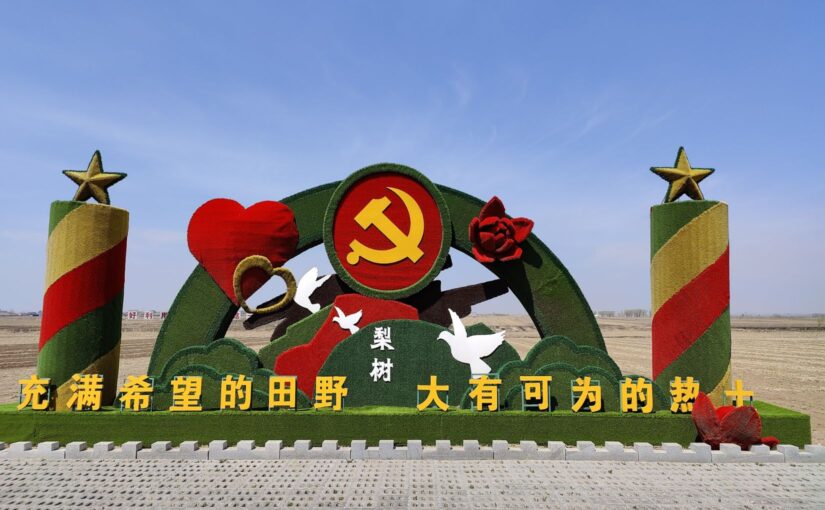The following article by Ali Al-Assam explores the issue of cooperatives in China, drawing on insights from the recent Friends of Socialist China delegation.
Ali – who is Managing Director of the NewsSocial Cooperative, as well as being a lifelong activist in the communist, anti-imperialist and progressive movements in both Britain and Iraq – describes the delegates’ visit to the Lu Wei Agricultural Machinery Farmers’ Professional Cooperative in Jilin, “a voluntary collective that now oversees 667 hectares, commanding 90 percent of the village’s farmable area.” Ali observes that the cooperative has allowed for greater mechanisation of agriculture, and has led to a 20 percent increase in income for participating families. The cooperative runs in a highly democratic manner, with profit-sharing decided collectively and major decisions made at general meetings. Ali observes that the cooperative “embodies a microcosm of efficiency, offering end-to-end services from ploughing to grain processing.”
The Chinese government is encouraging such cooperatives by providing subsidies for the purchase of agricultural machinery. The number of agricultural cooperatives is on the rise in China, and “the Chinese leadership has made exceptional efforts to nurture these cooperatives, advocating for the adoption of cutting-edge technology and sustainable farming practices… President Xi Jinping has underscored the significance of steering small-scale farmers towards modern agriculture to safeguard food security, a move he deems foundational for the nation’s modern socialist aspirations.”
This article was first published in English on NewsSocial and in Arabic on Mushtarek.
During my recent visit to China from April 14th to 24th, 2024, I had the opportunity to engage with seasoned members of the cooperative movement, among whom were British nationals who live in China. A highlight of my trip was spending a substantial part of a day, together with colleagues from ‘Friends of Socialist China’, exploring an agricultural cooperative in the north-eastern Jilin province.
The law on Specialised Farmer Cooperatives was passed by the National People’s Congress, coming into effect on July 1 2007. As stated by Tim Zachernuk In his excellent study of cooperatives in China: “The law acknowledges international cooperative experience as codified in the cooperative principles formulated by the International Cooperative Alliance. The law states that cooperatives are independent and autonomous organisations, should be democratically managed, and that their primary aim is to serve the interests of their members. There are no contradictions between the ICA principles and the Chinese law. A cooperative adhering to ICA principles would be perfectly legitimate under the cooperative law.” Tim Zachernuk pointed to some difficulties in applying the law which seems to have been resolved to some degree since 2015.
The Chinese government, particularly since 2020, has increasingly championed the cooperative model as an engine for employment enhancement, income growth for workers, and the stabilisation of rural and urban economies. These initiatives often dovetail with broader reforms aimed at reforming both privately owned and state-owned enterprises and bolstering employee ownership and governance participation.
China’s cooperative landscape is experiencing robust growth and enjoying strong government support. This growth is not only vast but also offers a multitude of learning and partnership opportunities. A notable advancement likely to further solidify democratic practices within cooperatives is the enactment of the Revised Company Law, set to take effect on July 1, 2024. This law is pioneering at the national level in that it establishes the employee representative assembly as the fundamental mechanism of corporate governance. For an in-depth understanding, refer to Dr. Guank Li’s comprehensive analysis of the law.
Insights into China’s Cooperative Landscape
The latest data offers a snapshot of the scope and impact of cooperatives across China:
- Agricultural Cooperatives: Recent figures indicate that China has over 2 million agricultural cooperatives, engaging nearly 100 million households. These entities are key to the agricultural sector, delivering services that elevate productivity and expand market access. The Chinese leadership has made exceptional efforts to nurture these cooperatives, advocating for the adoption of cutting-edge technology and sustainable farming practices. It is essential to note that China sustains almost a fifth of the global population on a mere 9% of the world’s arable land. Therefore, enhancing farmer incomes and technological integration through agricultural cooperatives is key to meeting these demands. President Xi Jinping has underscored the significance of steering small-scale farmers towards modern agriculture to safeguard food security, a move he deems foundational for the nation’s modern socialist aspirations.
- Consumer Cooperatives: While precise data on consumer cooperatives is elusive, their presence is significant in both urban and rural settings, impacting local economies by leveraging collective buying power to lower prices.
- Credit Cooperatives: There are approximately 1,900 rural credit cooperatives that serve tens of millions of rural inhabitants and businesses, filling a critical gap in financial services for communities underserved by conventional banks.
- Service Cooperatives: A broad category that spans healthcare, education, and transportation, service cooperatives play an essential role in enhancing access to vital services, especially in underdeveloped regions.
- Industrial Cooperatives: Though not as numerous as their agricultural counterparts, industrial cooperatives are gaining traction, particularly within the SME sector. These cooperatives facilitate scaling and cost reduction through collaborative efforts. A notable mention is Huawei, a tech colossus that aligns closely with cooperative principles, setting a remarkable precedent in the industry.
The Story of the Lu Wei Agricultural Machinery Farmers’ Professional Cooperative
During my journey through Jilin province, I had the privilege of visiting the Lu Wei Agricultural Machinery Farmers’ Professional Cooperative, together with colleagues from the ‘Friends of Socialist China’. Established in 2011 by Liu Wei and five other members, the cooperative directly confronts the challenges posed by agricultural mechanisation and the inefficiency of small, fragmented land holdings.
From Humble Beginnings to Agricultural Force
Lu Wei’s cooperative began with a clear vision: to unite fragmented farmlands and introduce modern machinery to amplify productivity and income. The result: A voluntary collective that now oversees 667 hectares, commanding 90% of the village’s farmable area. This consolidation has not only streamlined agricultural processes but has also proven to be economically transformative, members report a 20% income increase compared to non-member farmers.
A Model of Modernization and Efficiency
The cooperative doesn’t just farm farmland; it embodies a microcosm of efficiency, offering end-to-end services from ploughing to grain processing. This approach has swelled its ranks to 180 members and extended its services to an additional 600 households. When government subsidies for agricultural machinery became available, Lu Wei, himself a member of the Communist party, seized the opportunity, integrating 30 machines into their operations and garnering 1.5 million yuan in subsidies—catapulting the cooperative into a new echelon of agrarian modernity.
Governance in a Cooperative Framework
My discussions with the cooperative’s members, albeit brief, were useful. Major decisions are democratically made at general meetings, reflecting the members’ voices in the cooperative’s direction and operations. Echoing the broader economic governance in China, the Communist Party also plays a significant role in shaping the general trajectory of the cooperative. Profit-sharing is decided collectively: bonuses are distributed based on each farmer’s land contributions and their labour throughout the year, ensuring fairness and motivating hard work.
The cooperative’s wall display spelled out these principles in some detail, see below the original display and their translation.


Translation of the rules Lu Wei’s Rules and Regulations
Board of Directors Responsibilities
1. Organise and convene the members (representatives) conference and implement the resolutions of the members (representatives) conference.
2. Formulate the company’s development plan, annual production and operation plan, internal management rules and regulations, etc., submit them to the members (representatives) meeting for approval, and organise the implementation of the company’s various work tasks.
3. Formulate annual financial budget and final accounts, surplus distribution and loss recovery plans, and submit them to the members (representatives) conference for review.
4. Organise and carry out member training and various collaborative activities.
5. Manage the company’s finances and property and ensure the safety of the company’s property.
6. Receive, respond to, and handle inquiries and suggestions raised by executive supervisors or the board of directors.
7. Hire or dismiss the company’s managers, financial accountants and other staff.
8. Determine the capital contribution standards of members, review and approve the annual business report submitted by the Society’s Board of Directors and Supervisory Board.
9. Perform other duties assigned by the members (representatives) conference.
Responsibilities of the Chairman
1. Preside over members (representatives) meetings, convene and preside over board meetings.
2. Sign the capital contribution certificate of the members of the society.
3. Sign the appointment or dismissal of the company’s operation and management person in charge, financial accountant and other personnel.
4. Organise and implement the resolutions of the members (representatives) conference and the board of directors, and inspect the implementation of the resolutions.
5. Sign contracts, etc. on behalf of the company.
Responsibilities of the Supervisory Board
1. Supervise the implementation of the resolutions of the members (representatives) conference and this charter by the Board of Directors.
2. Supervise and inspect the company’s production and business operations, and be responsible for the company’s financial audit and supervision work.
3. Supervise the performance of the board of directors or board members and managers.
4. Make an annual monitoring report to the members (representatives) conference.
5. Make inquiries and suggestions for improvement of work to the chairman or the board of directors.
6. Propose to convene an extraordinary members (representatives) meeting.
7. Responsible for recording the workload or transaction volume (amount) between the directors and the company on behalf of the company.
8. Perform other duties assigned by the members (representatives) conference.
Safety production system
1. Seriously abide by the operating procedures of agricultural machinery, memorize operation matters, and obey leadership instructions.
2. Insist on following the vehicle to ensure your own safety, and do not leave your post without permission.
3. When working, you must wear three tight overalls and work with the vehicle.
4. It is strictly prohibited to drive a motor vehicle while sick or drunk.
5. No one is allowed to sit (stand) while hanging or lifting agricultural tools. After it is raised, it is not allowed to remove soil, weeds, etc., or perform maintenance, adjustment or troubleshooting below it.
6. No driving is allowed without the approval of the supervisor.
7. Carry out daily maintenance of the locomotive to keep it clean and in good condition.
8. Fill out the work acceptance form carefully and submit it to the accounting office for safekeeping in a timely manner.
Translated Introduction to the Coop
Today’s company is located in Balimiao Village, Kangping Street, Gongli County, and was established in November 2011. After 9 years due to the reform and development, the membership has grown from 6 households at the beginning of its establishment to 176 households now, and has influenced 600 households. The cooperative now owns 54 sets of large-scale agricultural machinery. It is a new agricultural business entity integrating agricultural social services, large-scale operations and the promotion and application of new technologies. In 2015, it was rated as one of the top ten demonstration cooperatives in Jilin Province, and in 2016, it was rated as a national farmer demonstration cooperative. In 2017, the chairman of the cooperative, Lu Wel, was named a national agricultural system model worker, and in 2019, he was named a special labour model in Jilin Province.
Since its establishment, the cooperative has adhered to the principle of win-win cooperation, given full play to its leading role, vigorously promoted the “four modernizations” management, and strived to improve the comprehensive benefits of agricultural production.
Achieve large-scale land management.
Adopting three models of “bringing land into the cooperative, land leasing and land trust”, the cooperative’s operating area has reached 690 hectares, accounting for 86% of the village’s cultivated land area. Among them, the area of “bringing land into the community” is 210 hectares, accounting for 30.4%; the area of “land leasing” is 108 hectares, accounting for 15.6%; the area of “land trust” reaches 372 hectares, accounting for 54%. Driven by the organisation of cooperatives, Balimiao Village has basically realised large-scale land management, and has better solved the problem of “who will farm the land and how?” At the same time, the rural labour force is liberated, and farmers participating in cooperative operations can go out and concentrate on exporting labour services, and the annual per capita labour income can reach more than 20,000 yuan.
Realise the mechanisation of production operations.
Concentrated and contiguous land made agricultural mechanisation a reality. The cooperative makes full use of the national agricultural machinery purchase subsidy policy to comprehensively improve the level of agricultural machinery and equipment.
Current cooperative
The total number of agricultural machinery equipment has grown from 1 set at the beginning of its establishment to 54 sets, covering all aspects of agricultural production, such as tillage, planting, management and harvesting, and realising full mechanisation of operations. Not only improves production efficiency, but also reduces production costs. The cost can be saved by 1,000 yuan per hectare
Realise the technologicalisation of production methods.
The cooperative conscientiously implements the strategy of “hiding food in the ground and hiding food in technology, insists an relying on science and technology for yields and benefits, and promotes the application of a series of advanced and major methods such as soil testing and formulated fertilisation, deep soll preparation, protective farming, and green prevention and control. The technology to increase grain production and income hall effectively improved the level of scientific farming. The average yield of com per hectare reaches more than 20,000 kilograms, which is 2,000 yuan more than conventional planting methods, and the income per hectare is increased by nearly 2.000 yuan
Achieve intensification of production and operations.
The cooperative innovates the way of agricultural cooperation and adopts the “five unifications” service model of unified supply of agricultural materials, unified planting management, unified plant protection services, unified agricultural machinery operations, and unified drying, collection and storage, which mobilises the enthusiasm of small farmers to participate in cooperative operations and effectively increases the number of farmers. farmers’ income. The net income of farmers who join the cooperative can reach more than 10.000 yuan per hectare of land, which is 20% higher than that of farmers who do not join the cooperative. In the future, the cooperative will adhere to the purpose of serving farmers, continue to innovate cooperation mechanisms, set an example and be a pioneer in promoting large-scale rural land management, accelerating the realisation of agricultural modernization, and leading farmers to increase their income and become rich, give full play to their demonstration and leading role, and contribute to building a moderately prosperous society in an all-round way, and contribute to the implementation of the rural revitalisation strategy.

